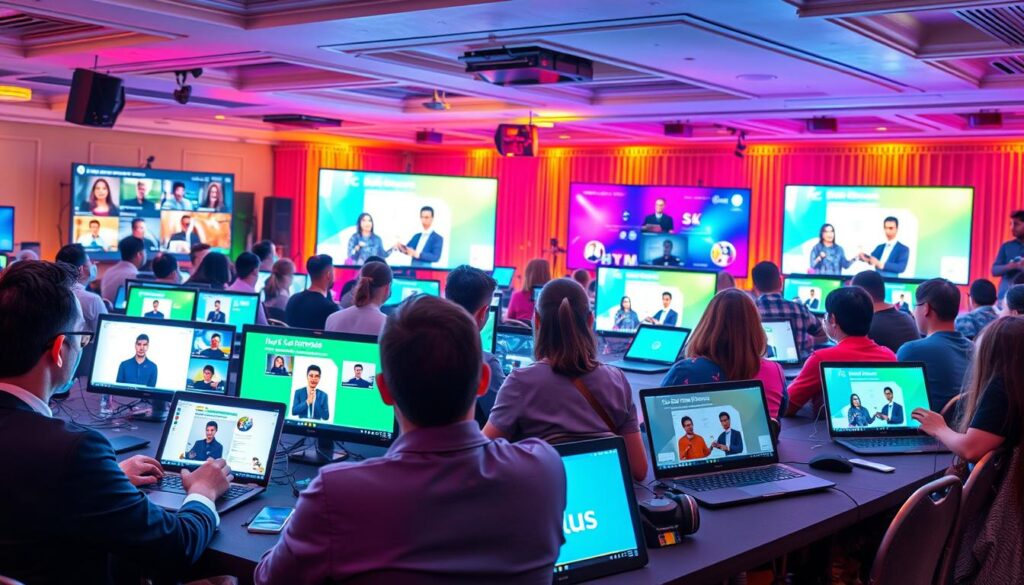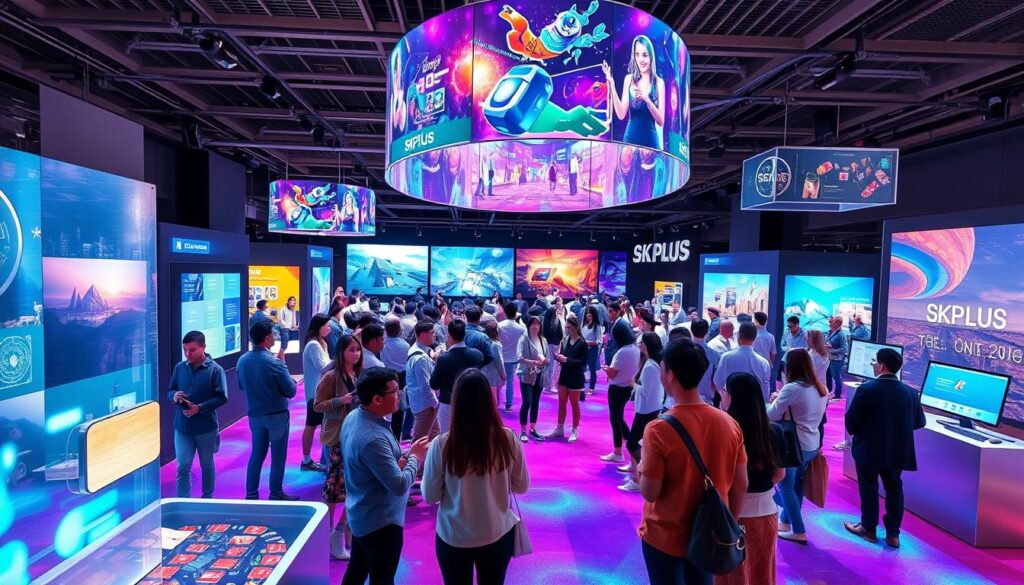אירועים וירטואליים הפכו למרכזיים בעולם הדיגיטלי המשתנה במהירות היום. הם עוזרים לחבר בין אנשים ומעוררים שיחות חשובות. מאמר זה מתעסק באופן בו אירועים וירטואליים פועלים, בסוגי הפגישות המקוונות השונות, וכיצד להפוך אותם למוצלחים.
מסקנות מרכזיות
- אירועים וירטואליים מציעים פלטפורמה גמישה ונגישה להגעה ועידוד קהלים בעידן הדיגיטלי.
- כנסים מקוונים ו-סמיטים דיגיטליים מספקים הזדמנויות לשיתוף ידע ושיתוף פעולה בין משתתפים מתפזרים.
- תערוכות וירטואליות ותערוכות מסחר מאפשרות לעסקים להתחבר ללקוחות ושותפים פוטנציאליים מרחוק.
- חוויות וירטואליות מעוררות, כמו שידור חי ו-וובינרים, יכולות ליצור תחושת נוכחות ואינטראקטיביות למשתתפים.
- אסטרטגיות עיסוק יעילות, כולל רכיבים אינטראקטיביים ו-שאלות ותשובות חיוניות, חיוניות לקידום אינטראקציות וירטואליות משמעותיות.
עליית אירועים וירטואליים
מגפת הקורונה הפכה אירועים וירטואליים לפופולריים יותר. אנשים וקבוצות משתמשים כעת באירועים מקוונים כדי לשמור על קשר. השינוי הזה הוא מכיוון שאנחנו צריכים דרכים חדשות לפגוש, לעבוד ביחד ולשתף רעיונות בלי להיות באותו מקום.
קבלת המהפכה הדיגיטלית
בגלל הפנדמיה, מתאכנים אירועים נאלצים לשנות את דרכם. הם משתמשים כעת באירועים מקוונים ו-סמיטים דיגיטליים יותר בתדירות. אפשרויות אלו מאפשרות לאנשים להצטרף מכל מקום, וכך קל להיות חלק מאירוע מבלי לעזוב את הבית.
יתרונות של אירועים וירטואליים
אירועים וירטואליים יש להם הרבה יתרונות. הם קלים יותר להצטרף אליהם, זולים ויכולים להגיע לאנשים מכל רחבי העולם. אין צורך בנסיעה או במקומות גדולים, ולכן יותר אנשים יכולים להצטרף. זה עושה אותם בחירה טובה לכל סוגי הקבוצות מאחר שהם חוסכים כסף.
| יתרונות של אירועים וירטואליים | אירועים פנים-אל-פנים מסורתיים |
|---|---|
| נגישות מוגברת | מוגבל על ידי מיקום גיאוגרפי |
| יעילות כלכלית | עלויות גבוהות לנסיעות, מקום האירוע ולוגיסטיקה |
| גישה גלובלית | מוגבל לקהלים מקומיים או אזוריים |
"הפנדמיה האצילה את האימוץ של אירועים וירטואליים, פותחת אפשרויות חדשות לעסקים ולאנשים להתחבר, לשתף פעולה ולשתף ידע ברמה גלובלית."
סוגי אירועים וירטואליים
האירועים הוירטואליים הפכו למרכזיים בעולם הדיגיטלי של היום. הם מאפשרים לאנשים מכל רחבי העולם להתחבר ולשתף רעיונות. בואו נסתכל על הסוגים העיקריים של אירועים וירטואליים שמשנים את תרבות האירועים.
כנסים מקוונים
כנסים מקוונים הם נפילה גדולה כאלטרנטיבה לכנסים מסורתיים. הם מאפשרים לאנשים להיפגש, לעבוד ביחד וללמוד ממומחים מכל מקום. ניתן להצטרף למגוון רחב של הרצאות לימוד, דיונים ורשתות, מה שהופך את השיתוף ידע והכרת חברים חדשים לפשוטים.
סמיטים דיגיטליים
סמיטים דיגיטליים מתמקדים בנושאים או תעשיות ספציפיים. הם מביאים ליחד מומחים, משפיעים ומקצוענים כדי לדבר על נושאים חשובים וטרנדים. ניתן להשתתף בסדנאות, שאלות ותשובות ודיונים, מה שהופך את האירוע למצוין ומעורר עניין.
| תכונה | כנסים מקוונים | סמיטים דיגיטליים |
|---|---|---|
| מוקד | רחב, כולל מגוון רחב של נושאים | מתמחה, מתמקדת בתעשיות או נושאים ספציפיים |
| קהל יעד | מגוון, מושך מקצוענים מרקעים שונים | נישה, מתמקדת בקהל מתמחה יותר |
| פורמט | מקיף, עם מספר ישיבות והזדמנויות רשת | אינטראקטיבי, עם סדנאות, שאלות ותשובות, ודיוני פאנל |
בין אם ברצונך להשתתף בכנס מקוון או פסטיבל דיגיטלי, ישנן הרבה הזדמנויות לפגוש, ללמוד ולצמוח ברשת.

אירוח אירוע וירטואלי מוצלח
תכנון אירוע וירטואלי דורש חשיבה ופרטנות מדויקת. עליך לבחור את הפלטפורמה הדיגיטלית הטובה ביותר ולוודא שהחוויה מעניינת. זה מבטיח שהאירוע הווירטואלי שלך יתנהל בצורה חלקה ויעזור לך להשאיר חותם.
בחירת הפלטפורמה הנכונה היא קריטית. חפש פלטפורמות אירועים וירטואליים שונות. וודא שיש להן ממשקים קלים לשימוש, כלים טובים לרשתות ושהן עובדות בצורה טובה עם כלים דיגיטליים אחרים. האפשרויות כוללות פלטפורמות כנסים וירטואליים, תוכנות וובינר או עולמות וירטואליים מרהיבים.
עיצוב האירוע שלך הוא גם מרכזי לחוויה נהדרת. וודא שהתוכן, הלוח זמנים והפעילויות מעניינים את המשתתפים. השתמש בסקרים, בפגישות קטנות, בהזדמנויות לרשת ובדרכים למשתתפים להצטרף.
להפיץ את המילה היא חיונית כדי למשוך קהל גדול ופעיל. השתמשו ברשתות חברתיות, אימייל ופנייה ממוקדת כדי לבנות תהליך ייחודי ולשכנע אנשים להירשם.
על ידי התמקדות בתחומים אלה ושימוש בשיטות הטובות ביותר, תוכלו לארח אירועים וירטואליים שימשכו תשומת לב, יבנו קשרים ויצרו עמדה מרשימה ברשת.

| שיקולים מרכזיים לאירוח אירוע וירטואלי מוצלח |
|---|
|
מעורבות עם הקהל הווירטואלי שלך
בעולם של היום, חשוב לשמור על קשר עם המשתתפים באירוע הווירטואלי שלך. השתמש ברכיבים אינטראקטיביים וב-שאלות ותשובות חיות כדי להרגיש מחוברים. בכך תוכל לוודא שהם מעורבים באירוע באופן אמיתי.
רכיבים אינטראקטיביים
הפוך את האירוע הווירטואלי שלך למהנה על ידי הוספת רכיבים אינטראקטיביים. הצע הזדמנויות לפגוש אחד את השני דרך צ'אט ופורומים. בנוסף, סקרים, חידות ומשחקים יכולים לשמור על כולם מרגשים ומעורבים.
שיחות שאלות ותשובות חיות
שאלות ותשובות חיות מאפשרות לקהל הווירטואלי שלך לדבר ישירות עם המרצים. על ידי התן להם לשאול שאלות מיד, אתה יוצר אירוע חי ואינטראקטיבי. זה לא רק שומר על עניין אצל האנשים, אלא גם נותן לך משוב כדי לשפר את האירוע שלך.
| רכיב אינטראקטיבי | יתרונות |
|---|---|
| רשת וירטואלית | עוזרת לאנשים להתחבר, לשתף רעיונות, ולהרגיש חלק מקהילה. |
| סקרים וחידונים אינטראקטיביים | שומרים על עניין, מקבלים משוב מיידי, ונותנים תובנות למארגנים. |
| שיחות שאלות ותשובות חיות | מאפשרות למשתתפים לדבר עם המרצים, ללמוד דברים חדשים, ולעזור לעצב את האירוע. |

"העיקרון המרכזי להצלחת אירוע הוא לעסוק בקהל הוירטואלי שלך. עם חלקים אינטראקטיביים ושאלות ותשובות חיות, אתה יוצר מרחב מעורר השתתפות שבו כולם נשארים מעורבים ופעילים."
אירועים וירטואליים: העתיד של האירועים
האירועים הוירטואליים מתגברים על חשיבותם בעולם האירועים. הם מוכנים לשנות את הדרך בה אנו חווים אירועים. בזכות טכנולוגיה חדשה, אלה האירועים יהיו בקרוב יותר מעוררי השתתפות וכיף.
מודלים היברידיים הם טרנד גדול באירועים וירטואליים. הם משלבים את הטוב ביותר מהאירועים באופן מקוון וממנים. בכך, יותר אנשים יכולים להצטרף ולהרגיש מחוברים.
המעבר לשינוי דיגיטלי מביא רעיונות חדשים לאירועים. פלטפורמות אירועים וירטואליים משתפרות עם תכונות כמו משחקים, חדרים אינטראקטיביים וסלונים וירטואליים. אלה מפכים את האירועים למעוררי השתתפות יותר.
טכנולוגיות כמו מציאת ממשק מורחב (AR) ומציאת ממשק וירטואלי (VR) ישנו את הדרך בה אנו רואים ומתקשרים עם אירועים. בקרוב, אנשים עשויים להרגיש כאילו הם באמת שם, מה שיעשה את האירועים יותר אמיתיים ומעוררי עניין.
עתיד האירועים נראה בהיר לאירועים וירטואליים. אלה שמשתמשים בטכנולוגיות חדשות יציעו אירועים שהם כיפיים, פתוחים לכולם, ועונים על מה שהאנשים רוצים.
מניעת ההזדמנויות לרשתות וירטואליות
עליית ה-אירועים הוירטואליים שינתה את המשחק בתחום הרשתות. כעת, תערוכות וירטואליות ו-תערוכות מסחר וירטואליות הן הדבר הגדול. הן מאפשרות לאנשים להתחבר, לעבוד ביחד, ולמצוא הזדמנויות עסקיות חדשות ברשת.
פתיחת הפוטנציאל של תערוכות וירטואליות ותערוכות מסחר
האירועים הוירטואליים הם משני המשחק בתחום ה-רשתות הוירטואליות. הם מאפשרים לאנשים לפגוש עמיתי תעשייה, שותפים פוטנציאליים, ומנהיגים מכל מקום. האירועים הללו נגישים יותר ויכולים להגיע לעוד אנשים, מה שהופך את זה לקל יותר למצוא הזדמנויות עסקיות חדשות.
תערוכות וירטואליות ו-תערוכות מסחר וירטואליות הן דרך נהדרת לשיחות בזמן אמת. הן משתמשות בצ'אט וידאו, חדרי צ'אט, וסטנדים וירטואליים למטרה זו. זה מאפשר לאנשים להתעמק בשיחות, לשתף רעיונות, וליצור קשרים שעשויים להוביל לפרויקטים חדשים.
האירועים הללו גם עוזרים לשמור על קשר לאחר סיוםם. אנשים יכולים להחליף פרטי קשר, לקבוע פגישות, ולשמור על הקשרים שלהם. זה משפר את חוויית הרשתות.
על ידי שימוש ב-רשתות ייחודיות ב-תערוכות וירטואליות וב-תערוכות מסחר וירטואליות, כולם יכולים לפתוח דלתות חדשות. זה עוזר ליצור קשרים חזקים ולגדול בעסקים בעולם הדיגיטלי.
חוויות וירטואליות מוקפות
עולם האירועים הווירטואליים משתנה במהירות. כעת, טכנולוגיות וחוויות מוקפות נמצאות בראש ובראשית. שידור חי ו-וובינרים מובילים את הדרך עם טבעם האינטראקטיבי והמעורר עניין.
שידור חי ווובינרים
שידור חי שינה את המשחק עבור אירועים וירטואליים. זה מאפשר למארגנים להתחבר עם הקהל שלהם בזמן אמת. אנשים יכולים להצטרף, לשאול שאלות, ולדבר על התוכן בזמן אמת.
וובינרים מציעים מבט קרוב יותר על הנושא, עם מומחים שמשתפים את ידעם. הם יוצרים מרחב למידה ממוקד עבור כל המעורבים.
החוויות הווירטואליות החדשות הללו הן יותר משיחות וידאו בסיסיות. הן מציעות אווירה עשירה ומעוררת השקפה. עם כלים כמו סקרים וחדרי פיצוץ, מארגנים יכולים לשמור על כולם מעוררים ומעורבים.
| תכונה | שידור חי | וובינרים |
|---|---|---|
| גודל הקהל | בדרך כלל קהלים גדולים יותר | קהלים קטנים ואינטימיים יותר |
| אינטראקטיביות | רמת אינטראקטיביות גבוהה (לדוגמה, שאלות ותשובות חיות, סקרים, צ'אט) | אינטראקטיביות בינונית (לדוגמה, צ'אט, מפגשי שאלות ותשובות) |
| מסירת תוכן | בעיקר חי, עם אפשרות להקליט ולשתף | מצגות מוקלטות או חיות עם שאלות ותשובות |
| שימוש | כנסים, הופעות, אירועי תעשייה | אימונים, סדנאות, הדגמות מוצרים |
האירועים הווירטואליים מתקדמים ומשיגים רמות של עשייה ועיסוק. שידור חי ו- וובינרים הם רק ההתחלה. אנו יכולים לצפות בפיתוחים נוספים ומרגשים בתחום האירועים הווירטואליים וב- חוויות עשירות בקרוב.
"עתיד האירועים הוא ווירטואלי, והשילוב של טכנולוגיות סוחפות יהיה מרכזי ליצירת חוויות מרתקות וזכות למשתתפים."
מסקנה
עליית האירועים הווירטואליים משנה את הדרך בה אנו מתחברים ועוסקים זה עם זה. אלה האירועים מציעים יתרונות רבים לעסקים וליוזמים באירועים. הם עוזרים ליצירת חוויות שמעוררות השראה ומשפיעות על אנשים, ומעצבים את עתיד האירועים.
עם העיסוק הדיגיטלי, יוזמי אירועים יכולים להגיע לעוד אנשים, לחסוך בעלויות ולהפוך את האירועים ליותר אינטראקטיביים. השינוי הזה הוא מרכזי להצלחה ולצמיחה של תעשיית האירועים בעתיד.
עתיד האירועים ישלב אלמנטים פיזיים ודיגיטליים.
אירועים וירטואליים יוסיפו לאירועים מסורתיים, ויעשו אותם טובים ומעוררי עניין יותר. על ידי שימוש באירועים וירטואליים, מומחי אירועים יכולים להמשיך לצמוח ולענות על צרכי הקהל שלהם בעולם ההתערבות הדיגיטלית.



